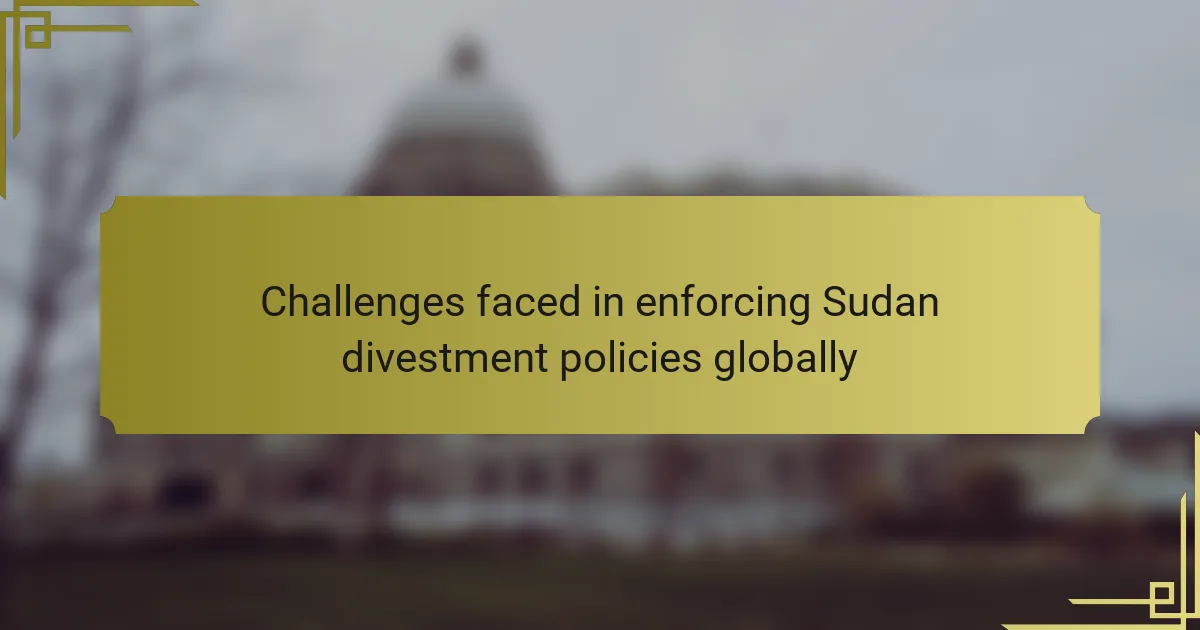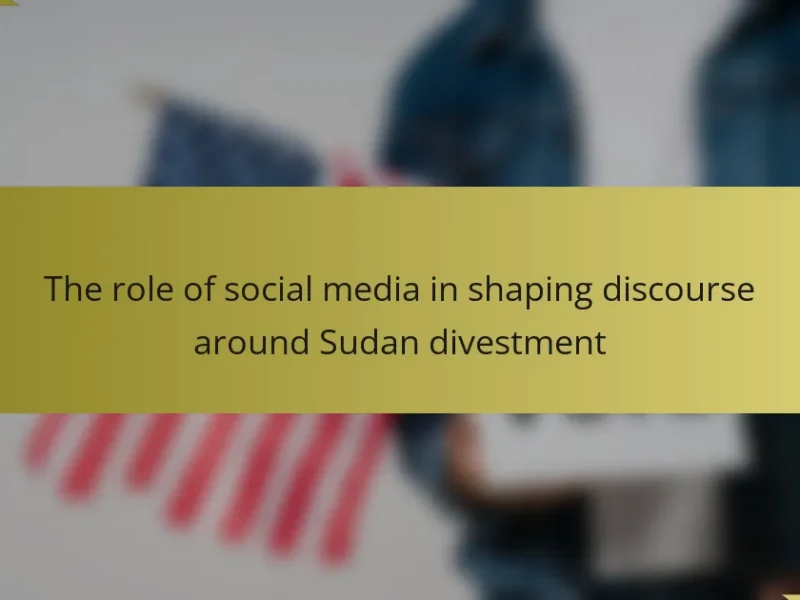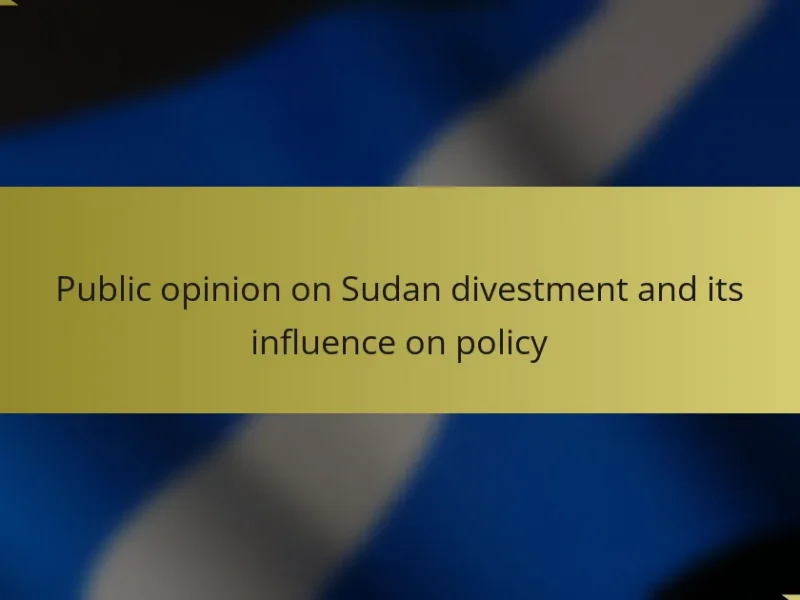The article examines the challenges faced in enforcing Sudan divestment policies on a global scale. Key issues include the lack of a unified international approach, varying levels of commitment among countries, and the complexity of global supply chains that complicate investment tracking. Insufficient transparency in financial transactions and conflicting geopolitical interests further hinder effective enforcement. Economic factors, such as the prioritization of profit over ethical considerations, also play a significant role in shaping divestment efforts. The article suggests that implementing targeted monitoring, reporting mechanisms, and public awareness campaigns can enhance compliance and accountability in enforcing these policies.
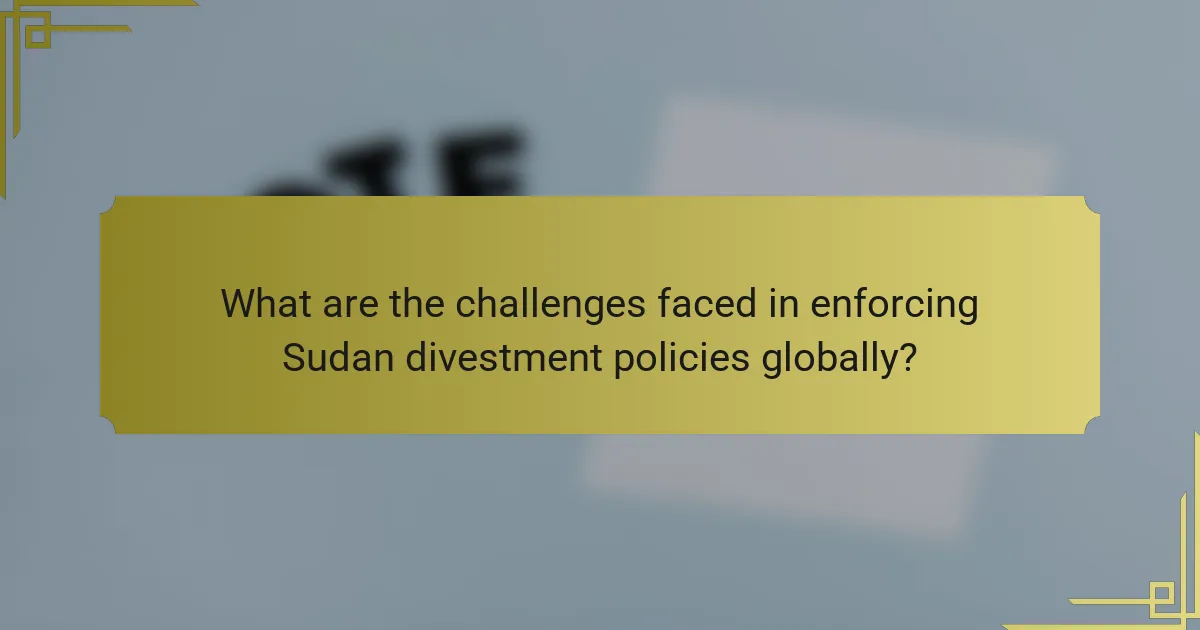
What are the challenges faced in enforcing Sudan divestment policies globally?
Enforcing Sudan divestment policies globally faces several challenges. One major challenge is the lack of a unified international approach. Different countries have varying levels of commitment to divestment, leading to inconsistent enforcement. Additionally, the complexity of global supply chains makes it difficult to trace investments. Some companies may operate in multiple jurisdictions, complicating compliance with divestment mandates. Furthermore, there is often insufficient transparency in financial transactions related to Sudan. This opacity hinders the ability to monitor and enforce divestment effectively. Lastly, geopolitical interests can conflict with divestment efforts, as some nations prioritize economic relations over human rights concerns.
Why is the enforcement of Sudan divestment policies important?
The enforcement of Sudan divestment policies is important to promote human rights and reduce funding for oppressive regimes. These policies aim to limit financial support to entities involved in human rights abuses in Sudan. Historical evidence shows that divestment can pressure governments to change harmful practices. For example, the divestment movements in South Africa during apartheid led to significant political change. By enforcing these policies, investors can align their financial activities with ethical standards. This action also raises awareness about the ongoing humanitarian crises in Sudan. Therefore, enforcement is crucial for both ethical investment and effective advocacy for human rights.
What are the global implications of these divestment policies?
Divestment policies aimed at Sudan can lead to significant global implications. These policies may result in reduced foreign investment in Sudan, impacting its economic stability. A decrease in investment can hinder development projects and exacerbate poverty levels. Additionally, divestment can isolate Sudan from international financial markets. This isolation may limit access to essential resources and technology. Furthermore, divestment can influence the geopolitical landscape by altering alliances. Countries that support divestment may strengthen ties with other nations advocating for human rights. Conversely, nations that oppose these policies may deepen their economic relationships with Sudan. Overall, the implications of divestment policies extend beyond Sudan, affecting global economic and political dynamics.
How do these policies affect Sudan’s economy and governance?
Sudan’s divestment policies significantly impact its economy and governance. These policies often lead to reduced foreign investment. Consequently, the economy suffers from limited access to capital and technology. Additionally, sanctions can restrict trade, further straining economic growth. Governance is also affected as the government faces increased pressure to comply with international standards. This pressure can lead to reforms but may also result in resistance from entrenched interests. The overall instability can deter international partnerships and aid, complicating Sudan’s recovery efforts. Ultimately, the interplay between these policies and Sudan’s economic and governance structures creates a challenging environment for progress.
What factors complicate the enforcement of these policies?
The enforcement of Sudan divestment policies is complicated by several factors. First, the lack of international consensus on the policies hinders unified action. Different countries have varying degrees of commitment, which creates gaps in enforcement. Second, the complexity of global supply chains makes it difficult to track investments accurately. Many companies operate through subsidiaries, obscuring their ties to Sudan. Third, the political landscape in Sudan can change rapidly, affecting compliance and enforcement efforts. Additionally, the potential for economic repercussions deters some investors from divesting. Historical precedents show that enforcement can be inconsistent, leading to skepticism about the policies’ effectiveness. These factors collectively challenge the ability to enforce Sudan divestment policies consistently and effectively.
How do political dynamics influence enforcement efforts?
Political dynamics significantly shape enforcement efforts regarding Sudan divestment policies. Changes in government leadership can alter priorities and commitment levels. For instance, a supportive administration may enhance enforcement, while an indifferent one may weaken it. Political alliances also affect the collaboration between enforcement agencies and international bodies. Countries with strong diplomatic ties may prioritize compliance, while strained relations can hinder efforts. Additionally, public opinion can drive political action, influencing how vigorously policies are enforced. Historical examples show that during times of political unrest, enforcement efforts often decline due to competing priorities. Overall, political dynamics are a critical factor in the effectiveness of enforcement efforts.
What role do international relations play in these challenges?
International relations significantly influence the challenges in enforcing Sudan divestment policies globally. Diplomatic ties can affect the willingness of countries to comply with divestment measures. Nations with strong economic relationships with Sudan may resist implementing sanctions. Additionally, international organizations play a crucial role in coordinating efforts to enforce divestment. For example, the United Nations can facilitate discussions and resolutions related to Sudan’s policies. However, differing national interests often lead to inconsistent enforcement of these policies. Countries may prioritize trade over human rights concerns, complicating global compliance. This interplay between diplomacy and economic interests creates obstacles in effectively enforcing divestment policies.
What are the legal obstacles encountered in enforcing divestment policies?
Legal obstacles in enforcing divestment policies include jurisdictional issues, contractual obligations, and potential retaliatory actions. Jurisdictional issues arise when states attempt to enforce policies beyond their borders. Contractual obligations can limit a government’s ability to divest from companies due to existing agreements. Retaliatory actions from targeted entities can lead to legal disputes or sanctions against enforcing states. Additionally, international law may complicate the enforcement of divestment policies, as treaties and agreements often prioritize trade relations. These factors collectively hinder effective implementation of divestment initiatives.
What specific laws and regulations impact enforcement?
The specific laws and regulations impacting enforcement of Sudan divestment policies include the Sudan Accountability and Divestment Act of 2007. This U.S. law mandates divestment from companies operating in Sudan and outlines penalties for non-compliance. Additionally, the Office of Foreign Assets Control (OFAC) enforces sanctions against Sudan, affecting financial transactions and investments. The International Criminal Court (ICC) warrants for Sudanese leaders also influence enforcement actions globally. These laws collectively create a framework for accountability and compliance in divesting from Sudan.
How do varying legal frameworks across countries affect compliance?
Varying legal frameworks across countries significantly impact compliance with regulations. Different countries have unique laws and enforcement mechanisms. These discrepancies can lead to challenges in adhering to international standards. For instance, some nations may have stricter penalties for non-compliance, while others may lack enforcement altogether. This inconsistency creates a patchwork of regulatory environments. Consequently, companies may struggle to navigate these complexities. They may face legal risks in jurisdictions with stringent laws. In contrast, they might exploit lenient regulations in other regions. Overall, these variations complicate the global enforcement of policies like Sudan divestment.
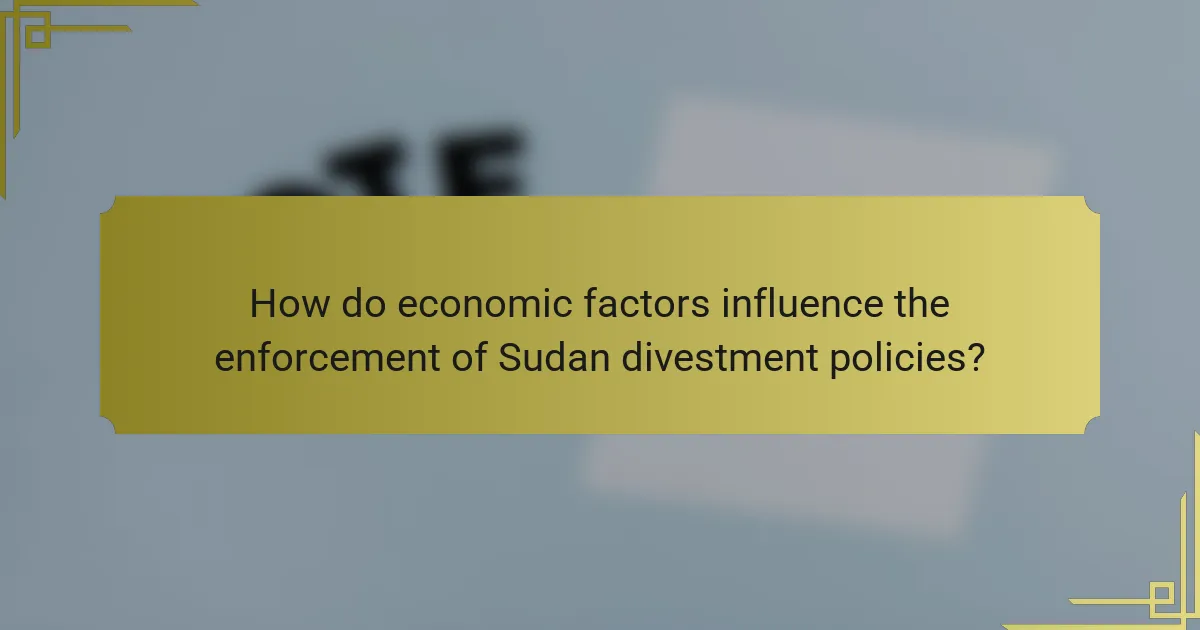
How do economic factors influence the enforcement of Sudan divestment policies?
Economic factors significantly influence the enforcement of Sudan divestment policies. Financial interests often drive companies and governments to prioritize profit over ethical considerations. For instance, countries with strong economic ties to Sudan may resist divestment efforts. This resistance can lead to weakened enforcement of policies aimed at promoting human rights and peace. Additionally, the global economy’s interconnectedness can create dependencies that complicate the imposition of sanctions. Economic repercussions, such as loss of trade or investment, may deter nations from fully committing to divestment. Historical examples show that economic incentives often overshadow moral imperatives in international relations. Thus, economic factors play a crucial role in shaping the effectiveness of Sudan divestment policies.
What economic interests are at stake for countries involved?
Countries involved in Sudan divestment policies have various economic interests at stake. These interests include access to natural resources, trade relationships, and foreign investment opportunities. Sudan is rich in oil and minerals, which attract foreign investment. Countries may seek to secure energy supplies and market access through these resources.
Additionally, countries may have geopolitical interests that influence their economic decisions. For instance, aligning with international sanctions can affect diplomatic relations and economic partnerships. The potential for economic sanctions can also impact domestic industries and job markets in the countries enforcing divestment policies.
Moreover, the enforcement of divestment policies can lead to reputational risks for countries that fail to comply. This can affect their attractiveness to foreign investors. Economic stability in the region can also be influenced by these policies, affecting neighboring countries and their trade dynamics. The overall economic landscape is thus shaped by these interconnected interests.
How do trade relationships impact the commitment to divestment?
Trade relationships significantly influence the commitment to divestment. Strong trade ties can create economic dependencies that deter companies from divesting. For instance, businesses may fear losing market access or facing retaliation in key markets. This reluctance often leads to a prioritization of profit over ethical considerations. Conversely, weakened trade relationships may enhance divestment commitments, as companies seek to distance themselves from politically or ethically problematic regions. Data shows that firms with substantial trade links to Sudan were less likely to divest during periods of international pressure. Thus, the interplay between trade relationships and divestment commitment is complex and context-dependent.
What are the potential economic repercussions of strict enforcement?
Strict enforcement of divestment policies can lead to significant economic repercussions. It may result in reduced foreign investment in Sudan. Investors often seek stable environments with predictable regulatory frameworks. Strict enforcement can create uncertainty, deterring potential investors. Additionally, local businesses may suffer from decreased access to international markets. This can lead to job losses and economic stagnation. Historical evidence shows that sanctions can adversely affect a country’s GDP. For instance, studies indicate that strict enforcement of sanctions in other regions led to economic decline. Thus, the potential economic repercussions are substantial and multifaceted.
What financial mechanisms exist to support enforcement efforts?
Financial mechanisms that support enforcement efforts include grants, appropriations, and penalties. Grants provide funding to organizations that monitor compliance with divestment policies. Appropriations allocate government resources to enforcement agencies, enhancing their operational capacity. Penalties impose financial repercussions on entities that fail to comply with divestment regulations. These mechanisms ensure that enforcement efforts are adequately supported and can effectively address violations. For instance, the U.S. government has allocated specific budgetary resources to agencies tasked with enforcing sanctions related to Sudan. This financial backing is crucial for maintaining the integrity of divestment policies.
How can international funding assist in enforcing divestment policies?
International funding can assist in enforcing divestment policies by providing financial resources for monitoring and compliance. These funds can support organizations that track investments and ensure adherence to divestment mandates. For example, international grants can enable the establishment of independent oversight bodies. These bodies can evaluate compliance with divestment policies and report violations. Additionally, funding can facilitate public awareness campaigns. Such campaigns can inform stakeholders about the importance of divestment and its impact. Research shows that financial backing enhances the efficacy of enforcement mechanisms. This leads to greater accountability and transparency in divestment efforts.
What role do sanctions play in influencing economic behavior?
Sanctions play a critical role in influencing economic behavior by restricting access to markets and financial systems. They create economic pressure on targeted countries or entities. This pressure can lead to changes in policy or behavior to align with international expectations. For example, sanctions against Sudan have aimed to limit its oil exports. Consequently, this has affected Sudan’s revenue and economic stability. Research shows that sanctions can reduce GDP growth in targeted nations. A study by Hufbauer et al. (2009) indicates that sanctions have a significant impact on trade and investment flows. Thus, sanctions are a powerful tool for shaping economic behavior on a global scale.
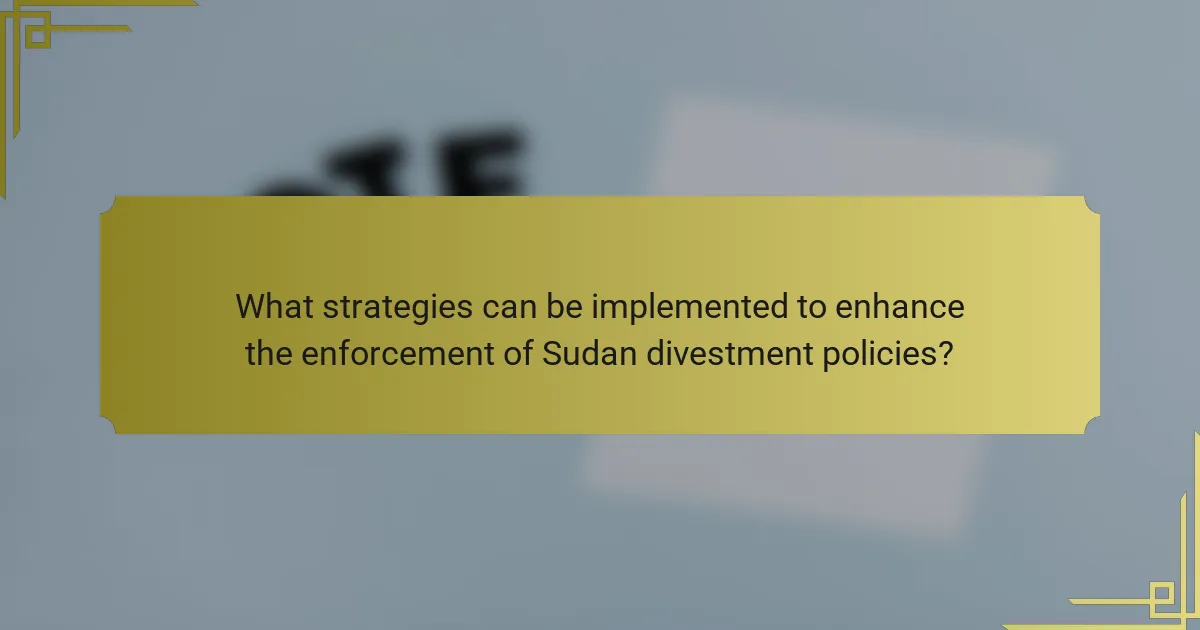
What strategies can be implemented to enhance the enforcement of Sudan divestment policies?
Implementing targeted monitoring and reporting mechanisms can enhance the enforcement of Sudan divestment policies. Establishing a comprehensive database of companies operating in Sudan will facilitate tracking compliance. Regular audits can ensure that businesses adhere to divestment guidelines. Collaborating with international organizations can strengthen oversight and accountability. Creating public awareness campaigns will educate stakeholders about the importance of divestment. Enforcing penalties for non-compliance can deter companies from violating policies. Engaging with local communities can provide insights into on-ground practices. These strategies collectively aim to improve the effectiveness of Sudan divestment policies.
What best practices can be adopted by governments and organizations?
Governments and organizations can adopt best practices such as establishing clear guidelines for divestment. These guidelines should outline specific criteria for investment and divestment decisions. Regular training on compliance and ethical investment practices is essential. Engaging stakeholders in the decision-making process fosters transparency and accountability. Monitoring and evaluating the impact of divestment policies is crucial for effectiveness. Collaboration with international bodies can enhance enforcement and compliance. Public reporting on divestment actions increases accountability and public trust. Leveraging technology for tracking investments can improve oversight and transparency.
How can collaboration among nations improve enforcement outcomes?
Collaboration among nations can significantly improve enforcement outcomes by enhancing resource sharing and information exchange. Joint efforts allow countries to pool their expertise and capabilities. This leads to more effective monitoring and enforcement of policies. For instance, collaborative frameworks can facilitate coordinated sanctions against entities violating divestment policies. Historical examples show that multilateral actions yield better compliance compared to unilateral measures. The effectiveness of the United Nations Security Council sanctions demonstrates how collective action can pressure non-compliant states. Enhanced communication channels also enable faster responses to violations. By working together, nations can create a unified front that deters non-compliance and promotes adherence to international standards.
What role do NGOs play in supporting enforcement efforts?
NGOs play a critical role in supporting enforcement efforts related to Sudan divestment policies. They advocate for compliance with these policies by raising awareness among stakeholders. NGOs often provide research and data that highlight the impact of non-compliance. They also engage in monitoring activities to ensure that companies adhere to divestment regulations. Additionally, NGOs facilitate dialogue between governments, corporations, and civil society. Their efforts can lead to increased transparency and accountability in enforcement. For example, organizations like the Sudan Divestment Task Force have mobilized public support to pressure companies to divest. This advocacy can influence policy changes and enhance enforcement mechanisms.
What lessons can be learned from past enforcement efforts?
Past enforcement efforts reveal the significance of comprehensive stakeholder engagement. Effective communication with local communities enhances compliance and support. Historical examples demonstrate that collaboration with international partners increases enforcement success. Transparency in enforcement actions builds trust and accountability. Past initiatives show that adapting strategies based on feedback can improve outcomes. Data collection and analysis help identify enforcement gaps and inform future policies. Consistent monitoring and evaluation are crucial for long-term effectiveness. Lessons from past efforts emphasize the need for flexibility in response to changing circumstances.
What successful case studies exist regarding divestment enforcement?
Successful case studies regarding divestment enforcement include the divestment actions taken by universities and pension funds against companies operating in Sudan. For instance, the University of California system divested over $3 billion from companies linked to the Sudanese government in 2006. This action was part of a broader movement to pressure the Sudanese government to end human rights abuses in Darfur. Additionally, the New York City pension funds committed to divesting from companies that support the Sudanese regime, which resulted in significant financial pressure. These cases demonstrate the effectiveness of coordinated divestment strategies in influencing corporate behavior and promoting policy change.
How can failures inform future strategies for enforcement?
Failures can provide critical insights for future enforcement strategies. By analyzing past enforcement failures, organizations can identify weaknesses in their approaches. This analysis allows for the refinement of tactics and the establishment of more effective guidelines. For instance, understanding why certain policies were ineffective can lead to better resource allocation. Historical examples show that learning from missteps can enhance compliance rates. Additionally, failures often highlight the need for improved communication with stakeholders. Engaging with affected communities can foster trust and cooperation. Overall, leveraging past failures can lead to more robust enforcement frameworks.
What practical steps can stakeholders take to improve enforcement?
Stakeholders can improve enforcement of Sudan divestment policies by enhancing collaboration among government agencies. This collaboration ensures consistent application of policies across jurisdictions. Stakeholders should also increase transparency in reporting divestment actions and compliance. Regular audits can help identify non-compliance and areas needing attention. Training programs for stakeholders can foster understanding of the policies and their implications. Additionally, establishing clear penalties for violations can deter non-compliance. Engaging with civil society organizations can provide grassroots insights and support enforcement efforts. Finally, leveraging technology for monitoring and reporting can streamline enforcement processes.
The main entity of this article is the enforcement of Sudan divestment policies globally. The article outlines the challenges faced in enforcing these policies, including the lack of a unified international approach, complexities in global supply chains, insufficient transparency in financial transactions, and conflicting geopolitical interests. It emphasizes the importance of enforcing these policies to promote human rights and the potential global implications, such as reduced foreign investment and economic isolation for Sudan. Additionally, the article discusses the legal, political, and economic factors that complicate enforcement, as well as strategies and best practices that can enhance compliance and effectiveness in divestment efforts.
